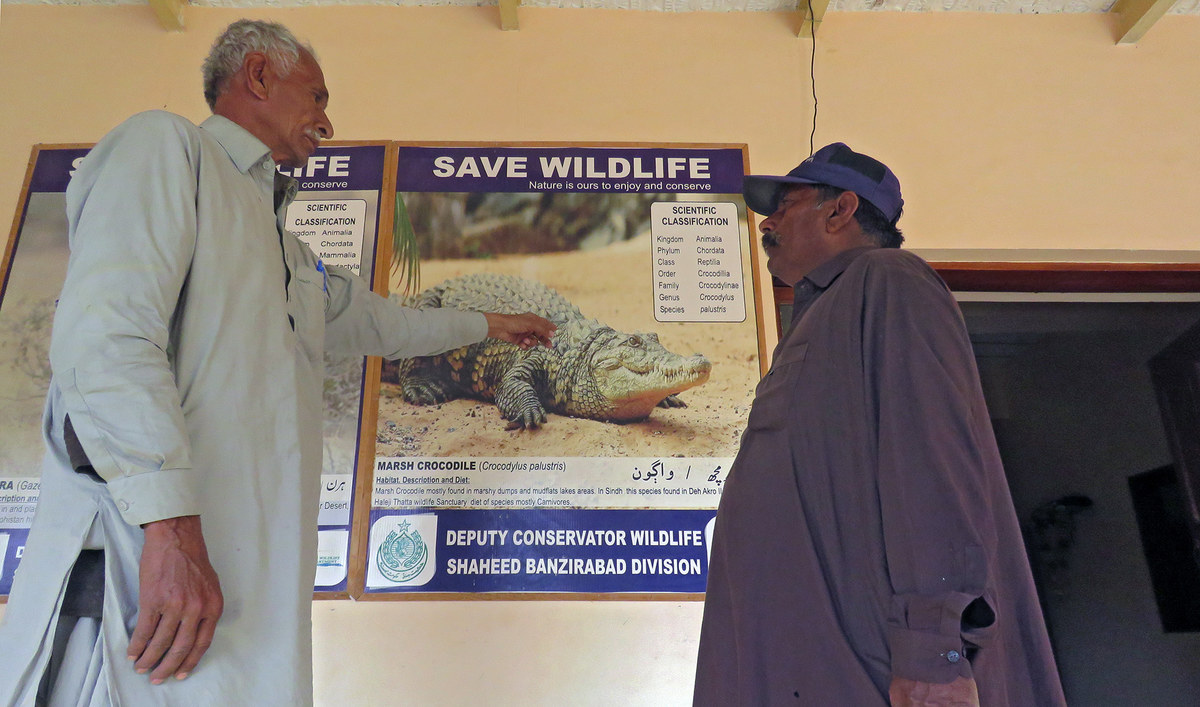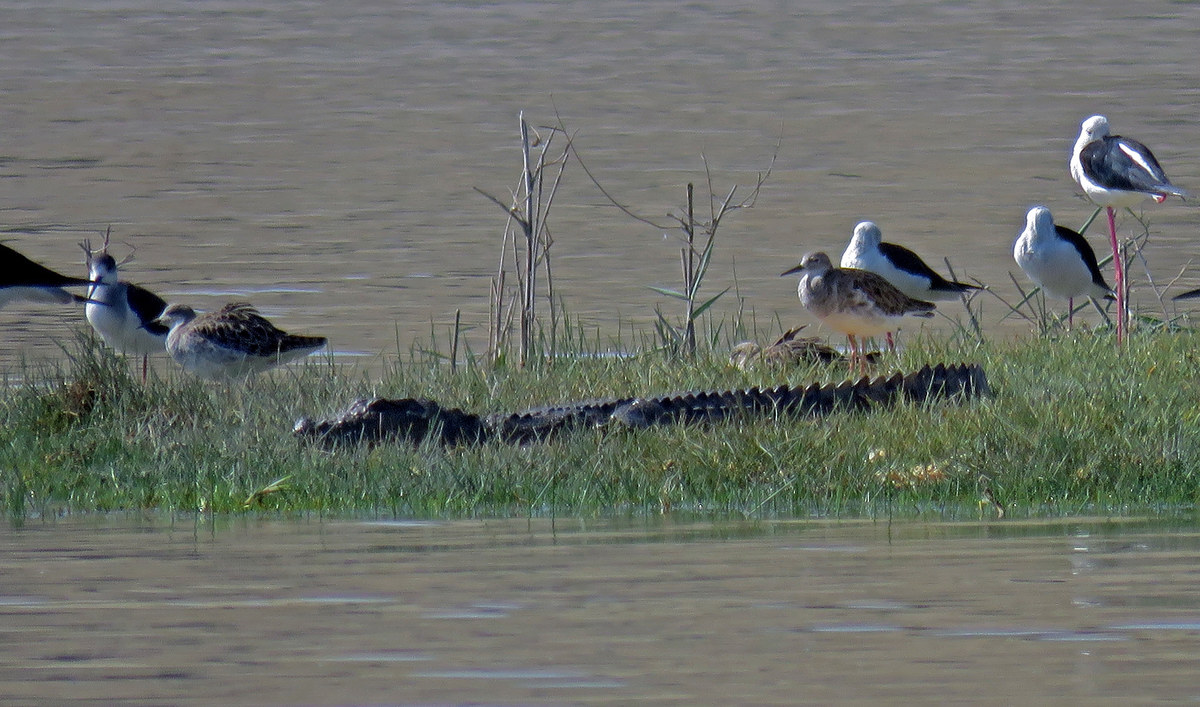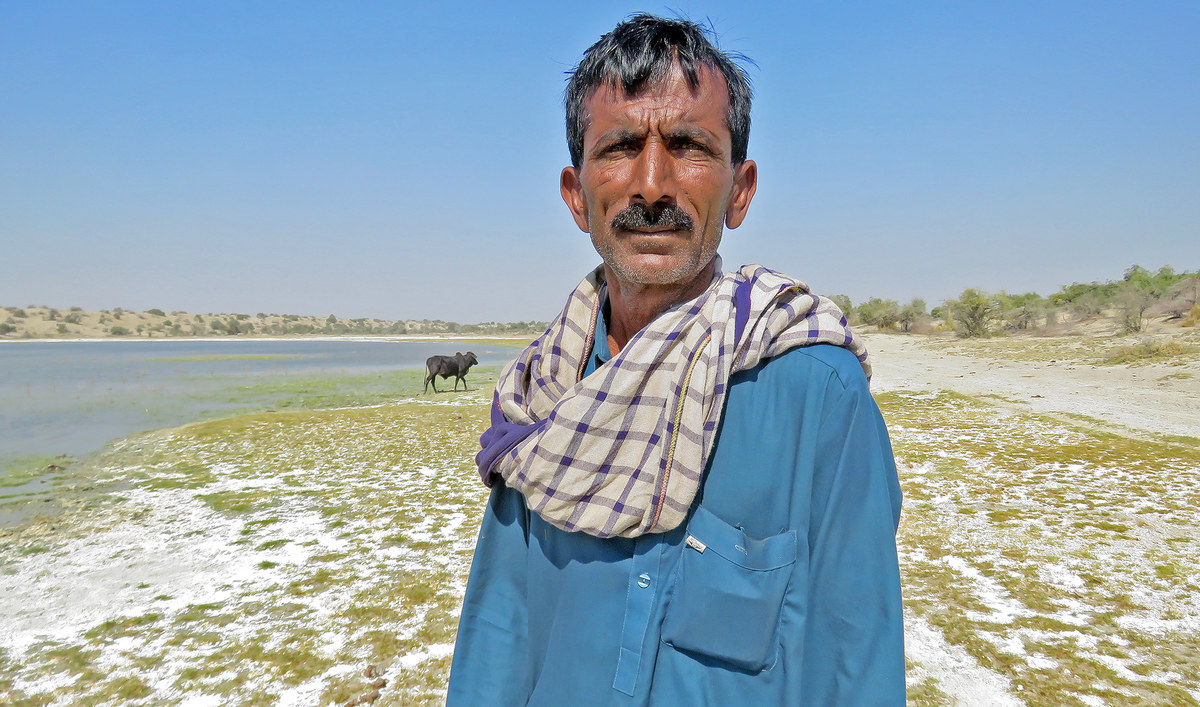SHAHEED BENAZIRABAD, Sindh: Habitat destruction at a sanctuary in the southern province of Sindh is threatening Pakistan’s vulnerable population of mugger, or marsh, crocodiles, officials and environmental experts say, calling on authorities to launch and implement conservation programs and ensure a steady supply of water to wetlands that are key to the survival of the animals.
Marsh crocodiles are already extinct in Bhutan and Myanmar and have been listed as vulnerable on the Intentional Union for Conservation of Nature (IUCN) Red List since 1982.
According to the Ramsar Sites Information Service that provides online information on wetlands designated as internationally important under the Ramsar Convention, over the last three decades, there has been a 90 percent reduction in the population of marsh crocodiles at the Deh Akro-II Desert Wetland Complex in Sindh’s Nara Valley, the country’s largest sanctuary for the animal.

A view of the gateway of the Deh Akro-II Desert Wildlife Sanctuary in Sindh, Pakistan, on January 29, 2021. (AN photo by Zulfiqar Kunbhar)
The whole complex, declared a wildlife sanctuary by the Pakistan government in 1988, spreads over 205 square kilometers, according to the Global Nature Fund, and is a unique example of a desert wetland ecosystem that hosts a variety of rare and endangered wildlife species including waterfowl, fish, otters and crocodiles.
The sanctuary wetlands have been traditionally recharged through the seepage of water from the River Indus-fed Nara Canal and rainwater - sources that authorities say are fast vanishing, thereby threatening mugger crocodiles that thrive in lakes, rivers, marshes and artificial ponds.

A signboard for the Deh Akro-II Desert Wildlife Sanctuary installed near the New Jamrao Canal in Sindh, Pakistan, on January 29, 2021. (AN photo by Zulfiqar Kunbhar)
Destruction and degradation of the wetland habitat due to the unsustainable use and over-exploitation of natural resources by local communities and water scarcity are the major threats to the ecological character of the area, according to the Global Nature Fund.
“When it was declared a wildlife sanctuary, there were around 45 wetlands at Deh Akro-II Desert Wetland Complex,” Riaz Khan Rind, a senior official at the Sindh Wildlife Department, told Arab News. “Today there are 32 wetlands left, out of which only eight are active.”

Local staff chat at the Information Center of the Sindh Wildlife Department at the Deh Akro-II Desert Wildlife Sanctuary in Sindh, Pakistan, on January 29, 2021. (AN photo by Zulfiqar Kunbhar)
“If this trend of the shrinkage of habitat continues, marsh crocodiles at their biggest sanctuary in the country will vanish in the next eight to ten years,” he added.
Another crocodile species, the gharial, locally known as saiser, had already vanished from Nara Valley, Rind said.
No official survey of Pakistan's crocodile population has ever been conducted but as per 2013 data from the Intentional Union for Conservation of Nature, there were 600 marsh crocodiles at different locations in Pakistan. The IUCN says though marsh crocodile populations in India and Sri Lanka were stable or recovering, a decline continues in Pakistan, Iran and Nepal.
A research report published by the department of zoology at the University of Sindh in 2012 said there were 189 marsh crocodiles left at the Deh Akro sanctuary, down from 2,000 two decades ago. he study said marsh crocodiles became extinct in Pakistan’s Punjab province in 2009 and only a small number were left in the southwestern Balochistan province. In Sindh, they could still be found in Nara Valley, Nosheroferoz, Thatta and Karachi.

A marsh crocodile in captivity at the Information Center at the Deh Akro-II Desert Wildlife Sanctuary in Sindh, Pakistan, on January 29, 2021. (AN photo by Zulfiqar Kunbhar)
Rind said water discharge to the Deh Akro wetlands had been reduced due to the construction of a new branch canal at Nara Canal and seepage diverting the Sim Nullah. Illegal agriculture inside the wildlife sanctuary through tube wells had also led to the drying up of the wetlands.
“Another main reason [for drying] includes agriculture encroachment by private influential parties inside the wildlife sanctuary who use groundwater through tube wells for cultivation,” Rind explained. “This situation leads to reduction in seepage to the wetlands, ultimately shrinking the habitat of crocodiles.”

A marsh crocodile takes a sunbath at the Bolahi Wetland at the Deh Akro-II Desert Wildlife Sanctuary, in Sindh, Pakistan, on January 29, 2021. (AN photo by Zulfiqar Kunbhar)
Another problem is that the government had allotted lands in the area to people before it was declared a wildlife sanctuary, which they now irrigate using tube wells.
Muhammad Baksh Khaskheli, 50, lives on government-allotted land in the Nihal Khan Khaskheli village in the sanctuary.
“For our agriculture fields we use tube wells as there is no other source of water,” he said. “Almost all wetlands in the area have become dry.”

Muhammad Baksh Khaskheli, a resident of the Nihal Khan Khaskheli village inside the Deh Akro-II Wildlife Sanctuary, poses at the Bolahi Wetland in Sindh, Pakistan, on January 29, 2021. There are many human settlements inside the protected area. (AN photo by Zulfiqar Kunbhar)
“There is a need to provide water artificially,” Dr. Zaib-un-Nisa Memon, assistant professor of zoology at the Shah Abdul Latif University in Khairpur, said, adding that nesting sites of the crocodiles needed to be caged. “There is a lack of awareness that leads to destruction of eggs and baby crocodiles by the local population.”
















